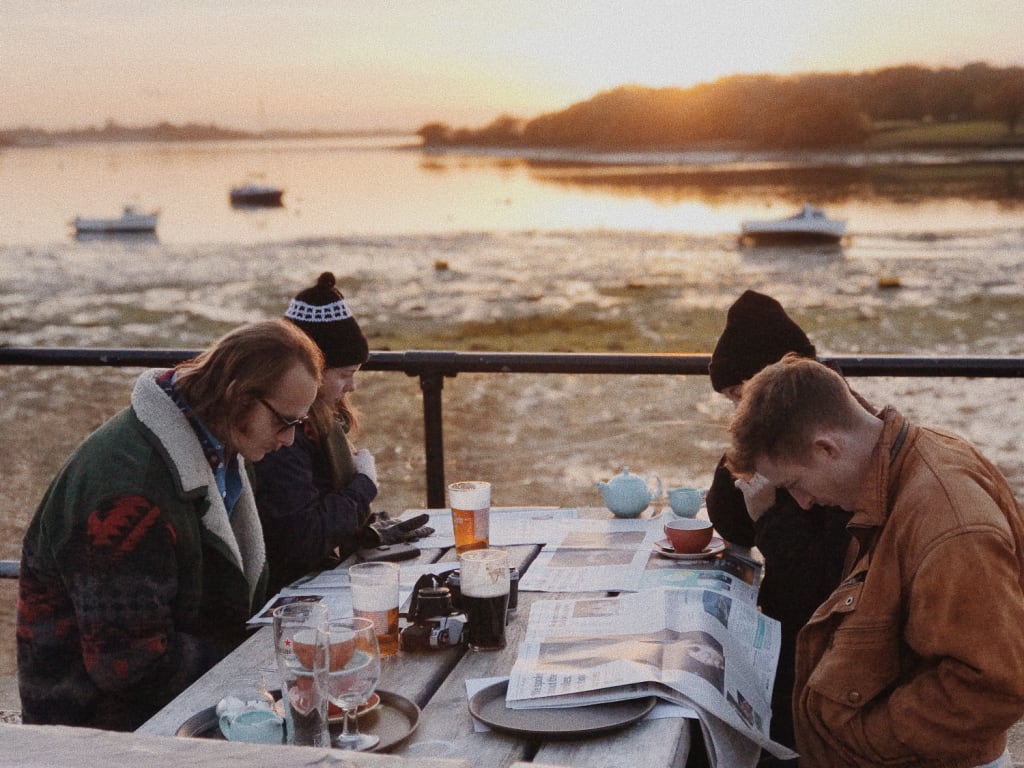What 'The Hunting Party' by Lucy Foley Teaches us About Friendship
This may be a suspenseful thriller, but a lot can be learned from these complex character studies

The Hunting Party was one of the most anticipated thrillers of 2019. During my first Christmas as a bookseller last year, I lost count of the number of copies I sold. Like everyone else, I was also drawn to the bright, yellow cover, and the intriguing story outlined in the blurb.
In many ways, it is a classic whodunnit. A group of lifelong friends travel to a remote area of Scotland for a holiday getaway to celebrate New Year. Amongst the promises of time away spent together in the beautiful wilderness, a sense of disorder starts to fester. This is a gripping, atmospheric and addictive thriller that teaches its readers a lot about toxic friendships.
Although I whizzed through the story in a few days, I’ve since taken time to reflect on how friendship is presented in this murder mystery novel. Here’s what I have learnt.
Old Friends Aren’t Necessarily Always Going to be Your Best Friends
“But that’s the thing about old friends, isn’t it? Sometimes they don’t even realise that they no longer have anything in common. That maybe they don’t even like each other anymore.” — Heather
The premise of the book is how a regrouping of old friends ends in an ultimate disaster. Whilst away, one of the friends in the group is murdered — and the rest of the story deals with uncovering who murdered who, and why. In an essence then, the novel hints at the idea that old friendships can fester rivalries, jealousies and bad histories.
Of course, old friendships can be beautiful and long-lasting — but they are also rare. People grow and change throughout their lives, so it is no wonder that our friendships sometimes follow suit. Throughout our lives, we will be closer to some of our friends and less so to others. But if we’re lucky, we’ll have at least one or two friends that may stay with us for life.
I think one of the lessons this book teaches us is that we should not be afraid to let go of stale friendships or cling on just because they are familiar.
Friends are Important, But So is Alone Time

“Sometimes solitude is the only way to regain your sanity.” — Heather
This group is a real mix of personalities, introverts and extroverts. But Heather, the host of The Lodge where the group are staying, and Katie, one of the friends, are the shy and introverted ones. Both revert to alone time to recharge their batteries and cope with the level of socialisation witnessed over the festive period.
Friends are so important — I don’t need to tell you why. But some of us, introverts especially, need alone time. We are the kinds of people who need to schedule in time to just be with ourselves, otherwise, we may retreat for days from the exhaustion of socialising. In other words — being alone — keeps us sane.
Additionally — as beings, we are born into this world alone. Throughout our lives, we will always shave to spend some time on our own, hence it’s important to learn to enjoy our own company, whether we’re introverts or extroverts.
Therefore, it pays to enjoy spending time with ourselves, as well as our friends. Lucy Foley teaches us, particularly through the character of Katie who is presented as the odd one out, that being alone and with yourself, can be just as valuable as spending time with friends.
Less is More
“After uni you spend the next few years windling those remaining friends down, realising that you don’t have the time and energy to trek across London or indeed the country to see people who barely have anything in common with you any more.” — Miranda
This group of friends is chaotic, contrasting and all over the place. Foley uses this clever technique where each chapter is told through a different point of view. It keeps you on your toes and it keeps you guessing as to who could have murdered who. It adds pace and suspense to the story — but it also reflects the chaotic mess that is the friendship group.
It is a privilege to have a lot of friends, but it is also hard to keep track of them all and regularly stay in contact. For many, this will have been the case this year in particular. The pandemic has made it impossible to travel, even across our own countries, to see friends and family as much as we’d like.
But over the course of a person’s life, it can become difficult as you have more commitments. Of course — the friendships you value and the people that are most special to you — will stay, regardless of the distance or time spent apart.
However, this novel hints at the idea that sometimes it’s better to have a handful of close friends that really know and appreciate you, rather than trying to immerse yourself in a large group that is more often than not, difficult to manage and more stress than it’s worth.
A Shared History is Sometimes Not Enough
“They saw that the only thing holding us together was some tenuous history.” - Emma
Life long friendships are wonderful — but rare. Cultivating them and sustaining them takes time and commitment. And each person involved, also needs to accept that the other person will grow and change over time. Sometimes you’ll grow apart and realise how different you are over the course of a lifetime — but the truly special friendships will stay.
After all, regardless of the time you have known each other, what counts is that a friendship is sustainable and beneficial for all involved. Foley paints a picture of this group of old school friends, gradually falling apart, as they realise they have very little in common and don’t like each other as much as they thought they did.
Characters such as Miranda, want to keep the group together for old times sake. But as events unravel, the group soon realises just how fragmented it is and how many what they thought would be, lifelong friendships, have reached their expiry date.
New Friendships can Make Way for Personal Growth
“Old friends don’t challenge us…I’d like, now, to get to know people who know me for me — not for who I used to be.” — Katie
Importantly, it’s not all doom and gloom. Out of this disaster of a holiday and the tragedy that unfolds, new realisations come to light. Katie, who finds herself in the thick of it all, realises that with her old friends, she had to pretend to be someone she wasn’t. She always felt like she was at the fringe of the group, never quite fitting in.
When everything is over, and she moves forward to rebuild her life, she reflects on the opportunity to form new friendships that allow herself to grow. In a way, she views it as a way to leave the past behind but gives us an important lesson on what friendships should not be.
A true friendship should fully allow people to be their unapologetic selves. Out of endings, can spring unlikely opportunities and chances for growth and Foley ends this one on a positive note.
I will always be a strong believer in the idea that reading fiction is an education in itself — and this book is a significant example. Amidst the excitement and suspense — I learned a lot about relationships, friendships, and people. Aside from being a fast-paced, atmospheric thriller that ticked all the boxes — The Hunting Party taught me a lot about friendship that I felt the need to share.
Foley paints a stark picture of how a group of old friends have very little in common, but rather, a festering, toxic, friction that slowly but surely pulls the group apart.
Some friendships will last a lifetime — but ultimately — we should not be afraid to let some go if they are not serving us.
Story originally published in Books Are Our Superpower, Dec 29, 2020.
About the Creator
Violet Daniels
Twenty-something graduate & newbie writer ✨ I write about books, writing, politics, mental health, and lifestyle.






Comments
There are no comments for this story
Be the first to respond and start the conversation.